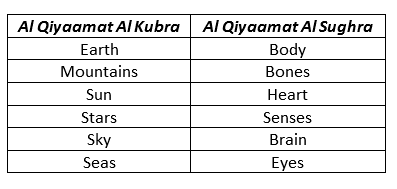Was the Holy Quran Sent for only Arabs?
There is no doubt that the Abrahamic religions are based in the Middle
East. All the prophets mentioned within the Quran came from the same general region of ancient Arabia. The animals and foods mentioned in the Quran are of Arab origin. There is abundant mention of deserts and oasis in the holy book, but none of snow. Some of the cultural practices that the Quran refers to in condemnation or approval may be irrelevant to a European living at the time of Prophet Muhammad.
However, none of this is incompatible with the Quran being a “universal”
book. The message of Islam is Tawheed, which is a universal message. Everything
else, including prophet hood are only means to deliver that message. When we
say that the Quran is universal, it implies that it’s core message of Tawheed
applies to everyone. In fact, the vast majority of the verses of the Quran are such that any human being can admire them and be guided by them, regardless of race, nationality, religion or ethnicity.
The detailed implications of the message of Islam, and the rules
governing the daily life will undoubtedly vary based on the cultural norms and
needs. In short, Tahweed is a single universal message but has infinite
manifestations in daily life – The Quran explicitly addresses one set of
manifestations which are unmistakably Arab.
When looking at a book from God as the final message, one could imagine
three scenarios:
- It contains details relevant to every single culture in the world.
- It contains details relevant to only some cultures.
- It contains details relevant to only one culture; i.e. where it was revealed.
Option 1 is not practical. Option 2 could be more problematic than
option 3, because the cultures that weren’t addressed may feel “left out”. It
may count as injustice to the cultures who were not addressed. This leaves
us with option 3, which is the only other logical choice.
Another reason may have to do with the way the human mind and societies
work – We are naturally able to understand and digest what is more relevant to
us. Therefore, the effectiveness and efficiency of a delivered message is
enhanced if it is delivered with the interests of the audience kept in mind. I
think this is a “necessary evil” which in many cases can be taken to an extreme
where the message gets isolated to a particular community, language or region.
This is why you see many religions identifying themselves with a particular race (Black
church, Chinese temple) or region (Greek Orthodox, Roman Catholic, Chinese
Taoism).
With Islam, the core need of relating to a people (i.e. Arabs to whom the
Quran was revealed) has been preserved:
كِتَابٌ فُصِّلَتْ آيَاتُهُ قُرْآنًا عَرَبِيًّا لِّقَوْمٍ يَعْلَمُونَ
“A Book whose verses have been detailed, an Arabic Qur'an for a people
who know” – [41:3]
But the idea of isolating the message to a culture has been shunned –
يَا أَيُّهَا النَّاسُ إِنَّا خَلَقْنَاكُم مِّن ذَكَرٍ وَأُنثَىٰ وَجَعَلْنَاكُمْ شُعُوبًا وَقَبَائِلَ لِتَعَارَفُوا ۚ إِنَّ أَكْرَمَكُمْ عِندَ اللَّـهِ أَتْقَاكُمْ ۚ إِنَّ اللَّـهَ عَلِيمٌ خَبِيرٌ
“O mankind,
indeed We have created you from male and female and made you peoples and tribes
that you may know one another. Indeed, the most noble of you in the sight of
Allah is the most righteous of you. Indeed, Allah is Knowing and Acquainted.”
– [49:13]


Comments
Post a Comment